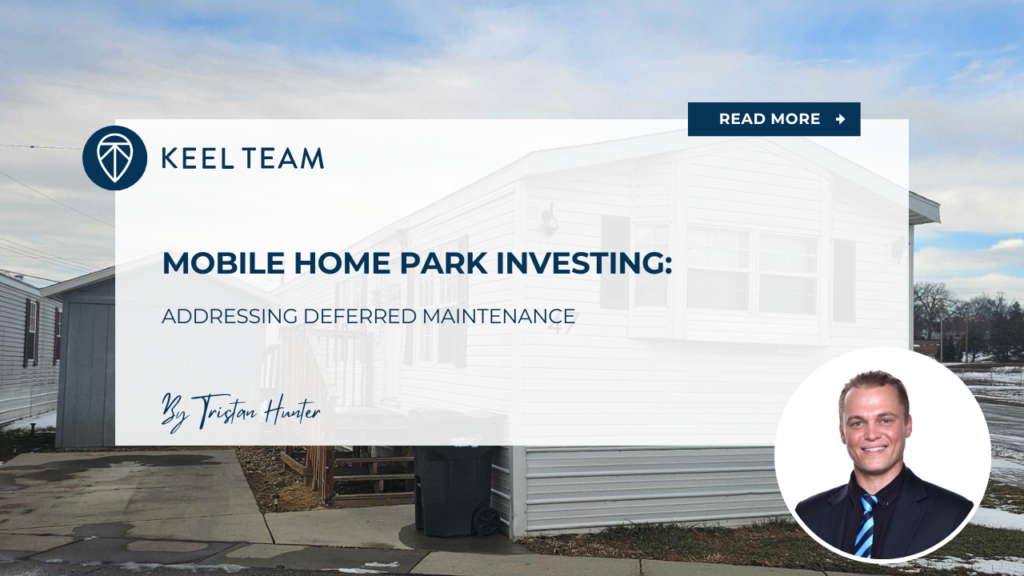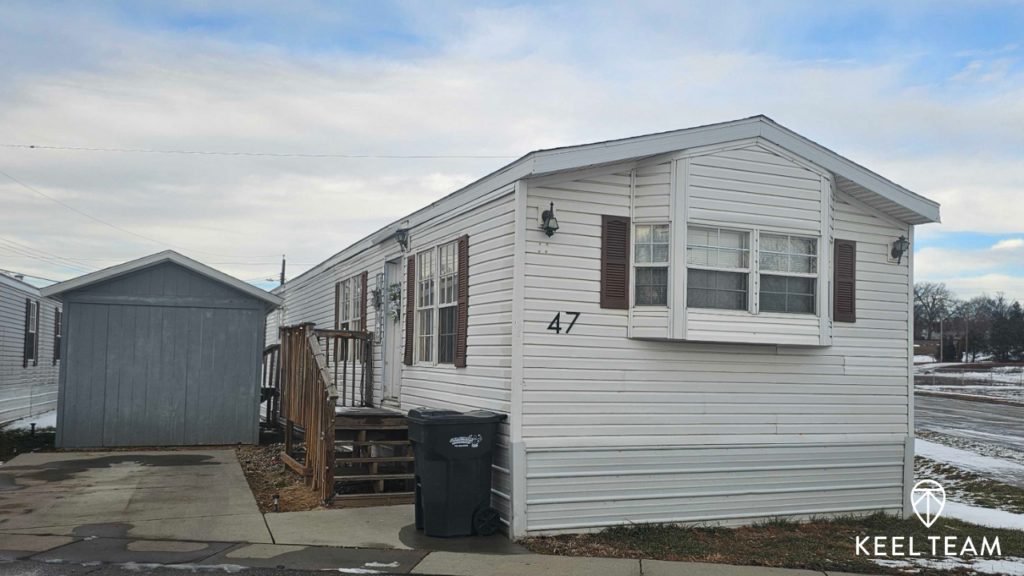Mobile Home Park Investing: Addressing Deferred Maintenance
-
 Tristan Hunter - Investor Relations
Tristan Hunter - Investor Relations

Deferred maintenance in mobile home parks may seem daunting, but for investors, it presents a strategic opportunity. While properties with outstanding repairs may appear less attractive at first glance, addressing deferred maintenance can lead to significant value-add potential. By recognizing these properties as hidden gems, investors can potentially enhance mobile home park investing performance and secure long-term financial returns.
What is Deferred Maintenance?
Deferred maintenance refers to repairs or updates that are delayed due to budget constraints, time, or oversight. In mobile home parks, this can range from worn-out infrastructure, such as deteriorating roads, to malfunctioning utility systems. When mobile home park owners neglect necessary upkeep, it can lead to lower property values, decreased tenant satisfaction, and, ultimately, higher vacancy rates. However, for savvy investors, deferred maintenance offers a chance to acquire properties at lower prices.
Why Deferred Maintenance Happens
Many mobile home parks, especially those owned by mom-and-pop operators, experience deferred maintenance due to limited resources. Often, long-time owners prioritize keeping rents low and maintaining cash flow over reinvesting in their properties. As a result, necessary repairs are postponed. Over time, this can accumulate into significant maintenance backlogs, which, while problematic for the current owner, may be an excellent opportunity for investors to step in and revitalize the mobile home park.
Identifying Opportunities in Deferred Maintenance
Investors seeking value-add mobile home park investments should view deferred maintenance as an opportunity rather than a liability. By assessing the extent of required repairs, they can gauge the true value of a property. Roads, sewer lines, electrical systems, and water infrastructure are often the main culprits in deferred maintenance. Evaluating these areas can reveal the potential for improvement.
For example, mobile home parks with neglected roads or broken utilities may drive tenants away. However, by upgrading these essential services, new ownership can increase tenant satisfaction, reduce turnover, and attract more residents. Furthermore, as the mobile home park’s condition improves, typically so does its overall value, which can lead to increased lot rents and higher returns.
Download our free eBook on the top 20 things you need to know BEFORE investing in mobile home parks!
The Benefits of Addressing Deferred Maintenance
While addressing deferred maintenance in mobile home parks requires upfront capital, the long-term benefits often outweigh the initial costs. First, improving the infrastructure of a mobile home park usually enhances the quality of life for its residents. Upgraded roads, for instance, generally improve curb appeal and also create a safer environment for residents.
Second, tackling deferred maintenance likely boosts the mobile home park’s overall income potential. Well-maintained mobile home parks often command higher lot rents because they provide better living conditions. This helps attract a broader pool of tenants, which can further increase occupancy rates. Additionally, higher occupancy usually improves the mobile home park’s financial performance, making it easier to secure favorable refinancing options.
Lastly, repairing deferred maintenance issues allows investors to likely take advantage of more favorable financing. Many lenders require certain maintenance benchmarks to approve loans. By proactively addressing these repairs, investors can qualify for lower-interest loans, which increases profitability potential over time.
How to Approach Deferred Maintenance in Mobile Home Parks
Investors interested in mobile home parks with deferred maintenance should take a strategic approach. The first common step involves conducting thorough due diligence. This includes assessing the current condition of the mobile home park and estimating repair costs. A professional inspection is often necessary to identify issues that may not be immediately visible.
After identifying the necessary repairs, prioritize the most critical maintenance tasks. For example, fixing water and sewer systems should come before cosmetic upgrades like landscaping or signage. Prioritizing essential repairs helps ensure tenant satisfaction and also keeps the mobile home park compliant with local regulations.
Once the critical repairs are complete, investors can focus on value-add projects, such as upgrading park-owned homes, improving amenities, and adding new revenue streams like storage units. These projects help further increase the mobile home park’s appeal and boost profitability potential.

Balancing Rent Increases with Maintenance Improvements
One of the key challenges in mobile home park investing is balancing rent increases with maintenance improvements. While it may be tempting to raise lot rents immediately after addressing deferred maintenance, investors should consider a more gradual approach. Sudden rent increases can drive tenants away, leading to higher vacancy rates and potential reputational damage.
Instead, mobile home park owners can implement modest rent increases over time, allowing tenants to adjust while still reflecting the improved value of the mobile home park. Providing transparency to tenants about the improvements being made can also ease concerns about rent increases. For example, owners can inform residents that upgraded utilities and roads enhance their quality of life, making the rent increases feel justified.
Case Study Example: Turning a Neglected Mobile Home Park Around
Consider a mobile home park with aging infrastructure and unmaintained roads. The mobile home park has experienced declining occupancy because of deferred maintenance, and its value has steadily dropped. An investor sees this as an opportunity to acquire the mobile home park at a discounted price and implement a value-add strategy.
After purchasing the mobile home park, the new owner immediately addresses the most pressing maintenance issues, starting with the roads and water systems. They bring in contractors to repave the streets and upgrade the plumbing. Over the course of a year, the mobile home park undergoes a transformation. Occupancy rates begin to rise, and tenants express higher satisfaction. As the mobile home park improves, the owner gradually increases rents in line with market rates.
Within a few years, the mobile home park’s value has significantly increased, allowing the investor to sell the property or refinance and secure lower-interest loans. The once-neglected mobile home park now provides steady income and long-term financial security for the investor, all thanks to a proactive approach to deferred maintenance.
Conclusion
Deferred maintenance in mobile home parks may initially seem like a hurdle, but for investors, it presents a unique opportunity. By strategically addressing outstanding repairs, investors can transform undervalued mobile home parks into potentially profitable assets. This generally enhances the quality of life for tenants and also boosts the mobile home park’s financial performance potential.
Investors who understand the likely benefits of deferred maintenance and how to approach it with a long-term strategy can unlock the hidden potential in mobile home parks. By taking on these challenging properties and investing in their improvement, they stand to gain substantial returns while providing valuable affordable housing. Ultimately, deferred maintenance may be one of the keys to unlocking greater success in mobile home park investing.
Book a 1-on-1 consultation with Andrew Keel to discuss:
- A mobile home park deal review
- Due diligence questions
- How to raise capital from investors
- Mistakes to avoid, and more!
Disclaimer:
The information provided is for informational purposes only and is not investment advice or a guarantee of any kind. We do not guarantee profitability. Make investment decisions based on your own research and consult registered financial and legal professionals. We are not registered financial or legal professionals and do not provide personalized investment recommendations.

Tristan Hunter - Investor Relations
View The Previous or Next Post
Subscribe Below 👇





